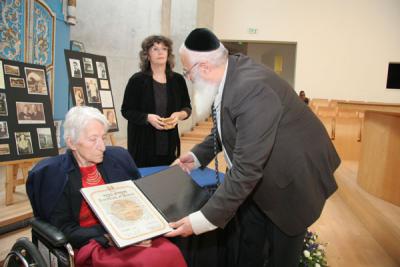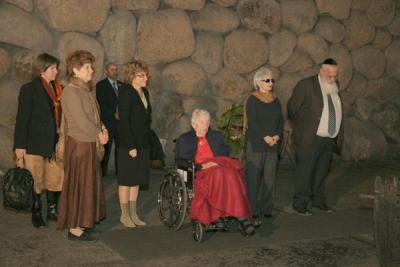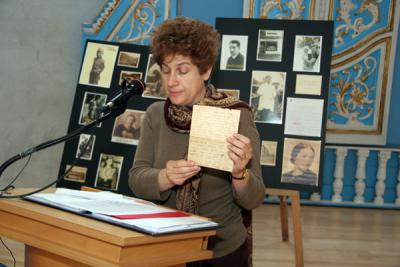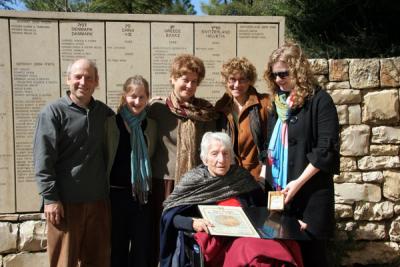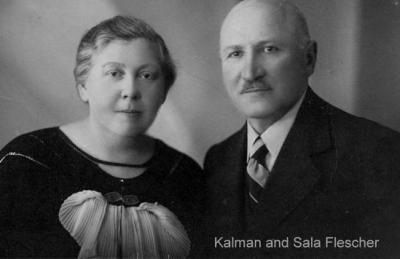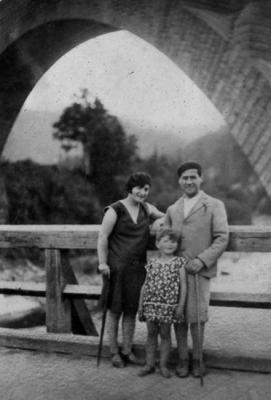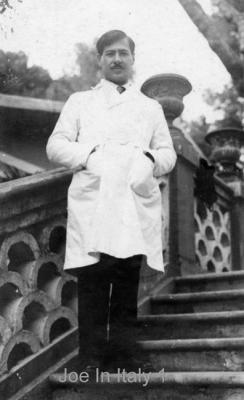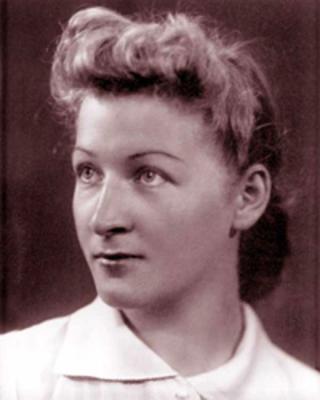21 February 2008
(February 21, 2008 - Jerusalem) At a ceremony recently held at Yad Vashem, the title of Righteous Among the Nations was bestowed upon Ms. Anna Riesen Flescher.
Beginning with a memorial ceremony in the Hall of Remembrance, the ceremony continued in the synagogue, where Mr. Nathan Eitan, Director General of Yad Vashem, presented Anna Flescher with the medal and certificate of honor of Righteous Among the Nations. The ceremony was attended by Anna Flescher’s daughters, Dr. Diana Flescher and Dr. Sylvia Flescher, as well as by Ms. Aliza Olmert, wife of Prime Minister Ehud Olmert and friend of the family, and Ms. Renate Schrenk, Cultural Attaché at the Swiss Embassy. The ceremony concluded with the unveiling of the inscribed name of Anna Flescher on the wall of honor in the Garden of the Righteous.
As of January 1, 2008, 44 individuals from Switzerland have been recognized as Righteous Among the Nations.
The Rescue Story
Dr. Joachim (Chaim) Flescher was born in 1906 in Buczacz, East Galicia. When he was 8 years old his family moved to Stanislawow. In 1923, at the age of 17, he left home and went to Vienna to study medicine. As he was leaving his family, he did not know that he was parting from them forever; that the world he had left behind was soon to be destroyed in the Holocaust.
Joachim eventually settled in Rome, where he established a thriving practice as a psychiatrist and psychoanalyst. The racial laws in Italy restricted the work of Jewish physicians, and Joachim’s work at the clinic gradually became more difficult. Many of his patients were not Jewish, and he had to continue their treatment in secret.
Throughout the entire period, he kept in touch with his parents and sisters through letters and postcards. He sent them parcels with food and medicine, which helped keep the family alive for some time. Some of these postcards, including those written during the Holocaust period, were preserved, and are now housed in the Yad Vashem Archives. They tell the story of a family torn apart and destroyed; of a desperate attempt to survive, of hope and despair. In January 1942, Joachim’s mother wrote “My dear son, we have received your parcels….You cannot imagine how precious and important your letters are to me. I read them again and again, savoring each word. May you have a long life for all those words of consolation you are sending. You are everything I hope for. May God let you live so I can see you another time…”
Joachim’s mother, Sala Flescher, was never to see her son again. She perished in the Holocaust and so did her daughters, Gusta and Zofka as well as Zofka’s husband Nehemia Orman, and their little daugher Emma. Joachim’s father, Kalman, had died earlier.Sala Flescher’s last letter, written in a shaky hand in January 1943, is signed “your unhappy mother”. The same months the ghetto of Stanislawow was liquidated. Eight months later the deportations in Rome were to begin.
Anna Riesen had come to Rome about the same time as Joachim. Her twin sister Klara worked as his assistant, and in 1942, when Klara returned to their native Switzerland, Anna replaced her. A year later, the Germans occupied northern and central Italy, and in October 1943, the deportation of the Italy’s Jews to the extermination camps began. The Jews of Rome were rounded up wherever they lived. The roundups resulted in the arrest and deportation of 1,800 Jews who were deported to Auschwitz-Birkenau. Almost all were murdered.
Joachim managed to hide with one of his non-Jewish patients, and his loyal assistant, Anna Riesen, took care of him, visited and provided food. After a German raid on the house, the couple came up with a clever and daring scheme – they decided that the safest place would actually be his own apartment on Botticelli Street. Anna boldly reported to the Swiss Consulate that Joachim had fled, that his whereabouts were unknown, and that she was moving into his apartment. She then obtained a Swiss certificate of protection to place on the door.
On Christmas Eve, 1943, Joachim slipped unnoticed into the house while the streets were deserted, and for the next six months he never left the apartment, living in total silence, not daring to even approach the windows, for fear the neighbors would discover his presence.
Danger was present all along that time, and there were some narrow escapes when the Germans conducted a search for escaped POWs. Another time two Italian Fascists came to the apartment – apparently as a result of a denunciation – and interrogated Anna while Joachim hid behind a closet. At one point, to allay the suspicions of the concierge and in order to convince the neighbors that Joachim had indeed fled, Anna traveled to the Vatican and sent a signed letter in Joachim’s name to the house in Rome.
Another dangerous moment came at the end of the war when refugees from the surroundings flocked to Rome that had been declared an open city. Apartment owners were ordered to house them, and in order to prevent this danger, Anna arranged for two acquaintances, Lithuanian girls, to live rent-free in the apartment in return for their silence.
Joachim hid in the apartment until the liberation of Rome by the Allied Forces on June 4th, 1944. He then returned to his practice, and in 1949 moved to the US, following an invitation by the New York Psychoanalytic Society. Anna joined him in 1950 and they were subsequently married. The couple had two daughters, Diana and Sylvia.
Over the years, Dr. Flescher’s reputation as an expert in his field grew. He published several books on psychiatry, and wrote a book on the psychological underpinnings of the Holocaust, but he never published his own story. Joachim passed away in 1976.
In its meeting of August 20th, 2007, the Commission for the Designation of the Righteous Among the Nations at Yad Vashem decided to award Anna Flescher the title of Righteous Among the Nations.




